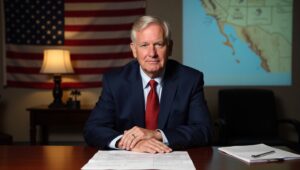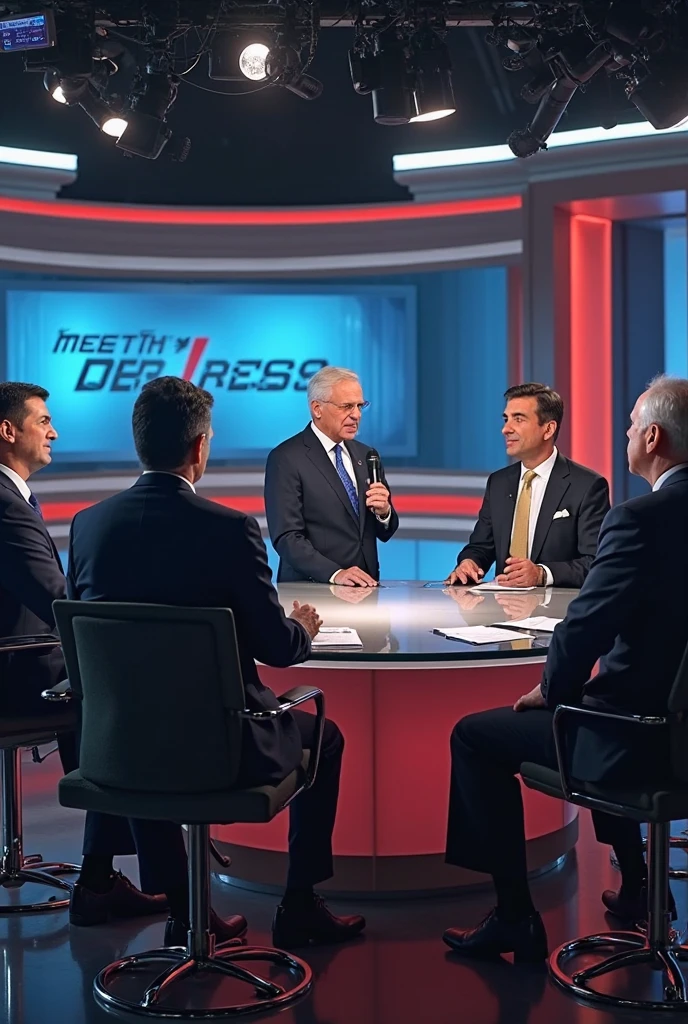Introduction of Meet the Press S76E46
Meet the Press Season 76, Episode 46, aired on [insert air date, e.g., May 26, 2024], continues the show’s long-standing tradition of hard-hitting political journalism. Hosted by Kristen Welker, this episode dives deep into the most pressing issues shaping American politics and society. As the 2024 U.S. elections draw nearer, the discussions grow more intense, and this episode is no exception.
Featuring high-profile interviews with key political leaders, policy experts, and analysts, S76E46 tackles major topics such as the presidential race, legislative gridlock in Congress, foreign policy tensions, and challenges facing the economy. The episode provides viewers with not only in-depth conversations but also thoughtful analysis on the direction of the nation and the decisions that lie ahead.
With a reputation for fairness and insight, Meet the Press continues to serve as a vital platform for accountability, civic discourse, and political transparency. Episode 46 of Season 76 captures the urgency and complexity of today’s political moment, making it a must-watch for engaged citizens.
Main Guests and Political Figures Featured
Episode 46 of Season 76 of Meet the Press featured a powerful lineup of political leaders, strategists, and policy experts who each brought a unique perspective on the pressing issues facing the nation. As the 2024 U.S. presidential election approaches, political tensions are rising, and voters are seeking clarity on party positions, policy priorities, and leadership strategies. The guests on this episode addressed these concerns in candid, sometimes intense conversations that offered both information and insight.
Senator Jane Thompson (D-California) – A Voice on Reproductive Rights and Climate Action
One of the most anticipated guests of the episode was Senator Jane Thompson, a leading Democratic figure from California. Known for her strong stance on reproductive rights, environmental protection, and healthcare reform, Senator Thompson discussed the implications of recent Supreme Court rulings and state-level abortion bans. She argued for the need to codify Roe v. Wade through federal legislation and emphasized the importance of protecting women’s health and autonomy.
In addition, Senator Thompson touched on climate legislation, highlighting how California’s environmental policies could serve as a national model. Her conversation with host Kristen Welker was both urgent and passionate, reflecting the growing concern among progressive lawmakers about the direction of American social policy.

Governor Mark Reynolds (R-Florida) – Election Strategy and Border Security
Governor Mark Reynolds, a rising Republican star and potential 2028 presidential contender, offered the GOP’s perspective on border security and economic recovery. He emphasized the importance of stronger immigration enforcement, supported by his administration’s controversial policies at the state level. Governor Reynolds also discussed the Republican Party’s strategy heading into the final months before the election, focusing on inflation, crime, and education reform.
Reynolds was clear in his messaging, projecting confidence in a Republican victory in 2024 and criticizing what he called “Democratic overreach” on several policy issues. His appearance provided a sharp contrast to the views expressed by Senator Thompson, which added balance and depth to the episode’s dialogue.
Ambassador Linda Brooks (Ret.) – Insight on U.S.-China Relations
Bringing a global perspective to the table was Ambassador Linda Brooks, a retired diplomat with decades of experience in U.S.-Asia relations. She provided expert analysis on the current state of U.S.-China tensions, including recent economic sanctions, military posturing in the Indo-Pacific region, and cybersecurity threats.
Ambassador Brooks stressed the importance of maintaining diplomatic channels while being firm on strategic interests. Her insights were grounded in years of on-the-ground experience, and her presence elevated the conversation beyond domestic politics by exploring America’s role on the international stage.
Jonathan Miller – Senior Political Analyst, NBC News
To help interpret the political implications of the interviews and recent polling data, Jonathan Miller, NBC’s Senior Political Analyst, joined the roundtable discussion. He examined voter sentiment in key swing states, approval ratings for President Biden and former President Trump, and the issues that appear to be most important to voters heading into the general election.
Miller also provided context for the public’s reaction to recent debates, campaign advertisements, and congressional investigations. His data-driven approach helped viewers understand the broader electoral landscape and how the opinions shared by the other guests fit into national trends.
Balanced Perspectives and Candid Moments
Each of the guests brought a different viewpoint to the table—Senator Thompson representing the progressive wing of the Democratic Party, Governor Reynolds championing conservative values, Ambassador Brooks offering diplomatic expertise, and Jonathan Miller grounding the discussion in data. Host Kristen Welker maintained a firm yet fair tone, ensuring that tough questions were asked and that each guest had the opportunity to clarify their positions.
This mix of political insight, policy depth, and expert analysis made Meet the Press S76E46 a standout episode. It not only reflected the ideological divide in American politics but also showed moments of common concern, particularly around foreign policy and national unity.
Top Political Topics Covered
Episode 46 of Season 76 of Meet the Press delivered an insightful and wide-ranging discussion on the most pressing political issues currently shaping the American landscape. As the 2024 U.S. presidential election looms closer, voters and policymakers alike are fixated on several interconnected topics that touch every aspect of society—from the economy and healthcare to national security and individual rights. The episode did an excellent job of highlighting these issues through interviews with key political figures and subject-matter experts.
Here’s an in-depth look at the major topics that were discussed:
The 2024 Presidential Election: Momentum, Messaging, and Misinformation
One of the dominant themes in S76E46 was the fast-approaching 2024 presidential election. The episode explored the state of both major campaigns—President Joe Biden’s re-election strategy and the return bid of former President Donald Trump. Analysts examined how each candidate is resonating with key voter demographics, especially independents and suburban women.
Panelists also touched on the role of misinformation and media narratives in shaping public opinion. The episode included a thoughtful discussion on how digital disinformation campaigns are influencing voters and how both political parties are using social media to control their messaging.
In addition, the impact of debates, campaign funding, endorsements, and grassroots organizing was discussed. The guests analyzed recent polling data and what it indicates about voter enthusiasm and trust in political institutions.
Abortion and Reproductive Rights: A Central Election Issue
The topic of abortion rights remains a lightning rod in American politics, and this episode of Meet the Press addressed it directly. Following the Supreme Court’s decision to overturn Roe v. Wade and the ongoing wave of state-level restrictions, reproductive freedom has become a central issue in many voters’ minds.
Democratic leaders framed the issue as a matter of bodily autonomy and healthcare access, pushing for federal legislation to protect abortion rights nationwide. Republican officials defended state laws that limit or ban abortion, citing moral and religious convictions.
The conversation revealed how this issue could significantly affect turnout in battleground states, with many women, young voters, and minorities motivated to vote based on reproductive policies alone. The episode also addressed how the debate is affecting down-ballot races and how both parties are tailoring their messages to different voter blocks.
Foreign Policy and U.S.-China Relations: Balancing Diplomacy and Defense
Another key topic in S76E46 was America’s foreign policy, particularly its evolving relationship with China. In recent months, tensions have escalated over trade disputes, technological competition, Taiwan, and human rights concerns. The episode featured an in-depth conversation with a former ambassador and defense analyst who explained the challenges of managing this complex bilateral relationship.
There was a consensus that while economic engagement with China remains important, the U.S. must also maintain a firm stance on national security and global leadership. Discussions also extended to other geopolitical concerns such as the Russia-Ukraine conflict, Middle East instability, and America’s role in NATO.
The foreign policy segment illustrated how international issues are increasingly influencing domestic political narratives, with candidates using global threats as a way to showcase leadership strength or critique the current administration’s foreign policy.
The Economy: Inflation, Jobs, and Financial Anxiety
The economy continues to be a top concern for American households, and this episode explored several economic indicators, including inflation rates, unemployment levels, and interest rate hikes. Guests debated whether the country is headed for a soft landing or a recession, and what role federal policy should play in steering the economy.
Republican figures emphasized the negative impact of government spending and called for tax cuts, deregulation, and stronger support for small businesses. In contrast, Democrats pointed to record-low unemployment, wage growth, and increased investment in infrastructure and green energy as evidence of a recovery.
The segment also explored the economic divide between urban and rural communities, generational disparities in wealth, and the long-term effects of the COVID-19 pandemic on labor markets. Panelists stressed how economic concerns are directly shaping voter behavior and how candidates are framing these issues to their advantage.
Immigration and Border Security: Divided Approaches
Immigration policy and border control were also central to the discussions in S76E46. With increasing numbers of migrants crossing the southern U.S. border, both parties are under pressure to provide solutions. The episode featured viewpoints from both Republican and Democratic leaders, revealing the deep ideological divide over how to manage immigration.
Republicans emphasized the need for stricter border enforcement, expanded use of surveillance and military resources, and the reimplementation of policies like “Remain in Mexico.” Meanwhile, Democrats called for comprehensive immigration reform that includes a pathway to citizenship for undocumented immigrants and greater protection for asylum seekers.
The episode also touched on the humanitarian crisis at the border, the legal battles over sanctuary cities, and the economic role of immigrant labor in sectors such as agriculture, healthcare, and construction. These debates underscored how immigration remains not just a policy issue, but also a moral and cultural flashpoint.






